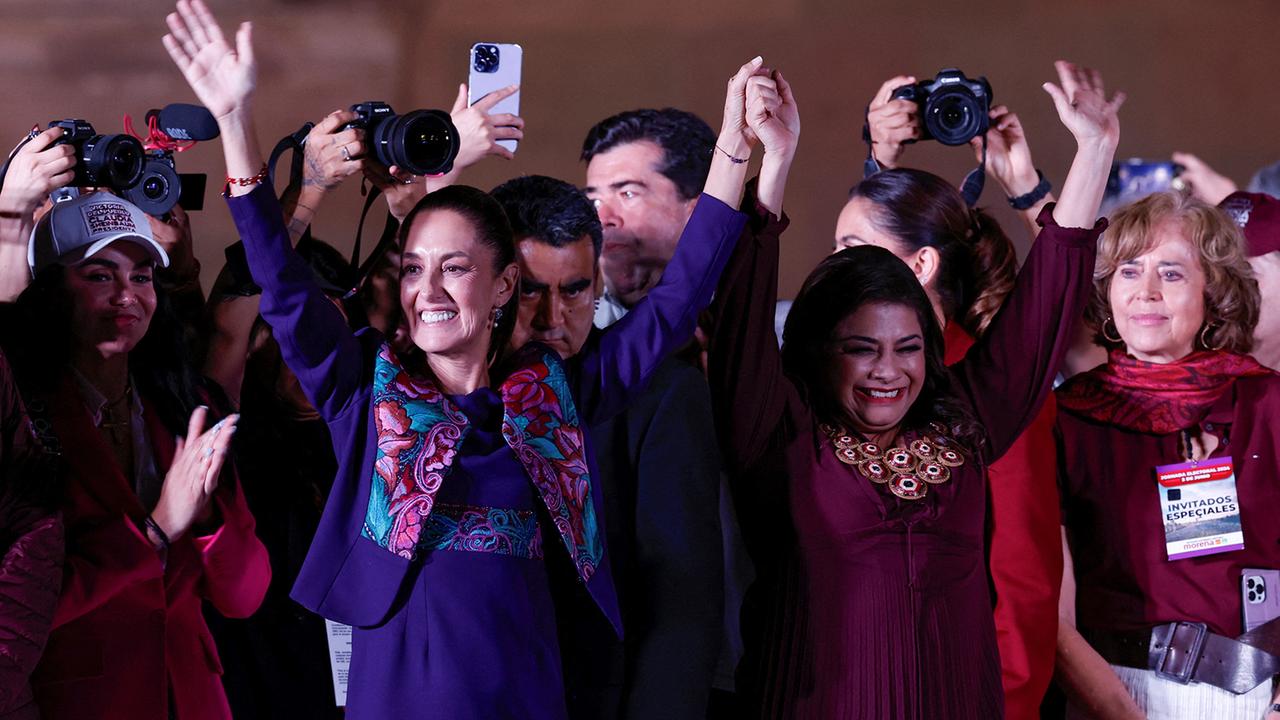portrait
Drug cartels, a lack of security and migration – Mexico's new President Sheinbaum is not lacking in challenges. What can the first woman to lead the Latin American country achieve?
After the election results are announced, people cheer her on in the Zócalo, the central square in front of the government palace.
#EsClaudia – Claudia is the right one. This slogan could be seen all over the country a few years ago – painted on walls and house facades, long before the actual election campaign had even begun.
Now she has actually become one. Claudia Sheinbaum from the ruling left-wing Morena party will be the first female president of Mexico. She is 61 years old. She always wears her long, dark hair combed back in a braid.
She is often described as colorless and cold. She lacks the charisma of the Mexican president. Andrés Manuel López Obrador sought to be close to people, repeatedly toured the country and refused to travel abroad.
Sheinbaum is just his puppet, they say. She calmly addressed this at a press conference a few months ago: “Many columnists say I have no personality and that the Mexican president dictates everything I have to do. And if I become president, he would call me every day.” She is sure of herself, she emphasized to the press.
Physicist and PhD Environmental engineer
However, Sheinbaum also represents the more rational and qualified wing of Morena, as other observers put it. The 61-year-old has a lot to show for herself. She is a physicist and has a doctorate in environmental engineering and was already the first female mayor of the metropolis of Mexico City. Her electoral success is certainly due above all to the great support of the Mexican president.
He still has approval ratings of between 50 and 80 percent. López Obrador was the first president to put poverty reduction on the agenda. He has launched a number of social programs. Among other things, he has doubled the minimum wage. He has received a lot of recognition from the Mexican population for this. Critics doubt the sustainability of his programs.
Sheinbaum repeatedly emphasized that she would continue his policies and also formulated noble goals: improving the Mexican education system and security, as well as investing in clean energy.
However, it is important to implement effective measures in a timely manner, explains Mexican political scientist Carlos Pérez Ricart. “From October 1, when the new president takes office, she must draw up a new social pact. She must eliminate the impunity that organized crime currently enjoys in Mexico.”
Some people believe that Sheinbaum can bring about a change of direction as president.
Violence against women is a major problem in Mexico
Around 100 people continue to die a violent death every day. Eleven of them are women. At least two of these are considered femicides, murders of women because of their gender. The crime clearance rate is approaching zero. Even if the Mexican president claims otherwise, the situation in the country has hardly changed.
95 percent of crimes are not punished and the perpetrators get away with it. In parts of states such as Michoacán, Guerrero and Tamaulipas, there is simply no state anymore. Organized crime reigns there. “If there is no security, the problem of poverty and inequality in the country will not be solved,” says political scientist Carlos Pérez Ricart.
The challenge is immense. The Mexican president is leaving his successor a difficult legacy. According to Amnesty International, 114,000 people are believed to have disappeared.
Tanja Salazar has been looking for her nephew since October 30, 2022. From one day to the next, he disappeared in Michoacán, a state in which organized crime is particularly active.
She does not believe that anything will change with Sheinbaum. There are no signs of that, she says on the sidelines of a demonstration by family members in Mexico City. “Everyone always talks about a commission of disappeared persons, but they do not talk about how they can specifically support the family members,” says Salazar.
In a country that embraces criminals, nothing will change.
Nevertheless, many people are hoping for a change of direction. The question is how far Sheinbaum will be able to break away from her predecessor in the long term. Whether she will push ahead with the energy transition instead of continuing to rely on fossil fuels like López Obrador, and whether she will put the military and the National Guard in their place, which have gained more and more power, including domestically, under the Mexican president.
“She has the knowledge and the courage to do so”
During her time as mayor, Claudia Sheinbaum set up a ministry for women and, for example, ensured that there were special compartments for women on public transport and that there was more lighting in particularly dangerous districts like Itzapalapa. But that is not enough to bring about structural change. Not everything will depend on her own willingness. A first female president at the top in Mexico is likely to have many opponents in a system characterized by machismo and rigidity.
Feminist and documentary filmmaker Guadalupe Sánchez Sosa believes in Sheinbaum's potential. She may not have a feminist past herself, but she has a social background – including from her parents. “She studied at a public university, she fought for public education.” She knows the country. “And she will bring the right people into the cabinet who will strengthen her and the feminist movement.”
If you listen around, many people have high hopes for the newly elected president. “I am a hardworking and honest woman. I even have a lump in my throat. She is the first woman to represent our country and she has the knowledge and courage to do so.”
The nationally known singer Vivir Quintana, who advocates for women's rights and denounces violence against them in her lyrics, reminds Sheinbaum in a letter of the historical debt towards women in Mexico. She calls on Sheinbaum to act wisely and sensitively in the face of “this country that cries out in pain”.
Anne Demmer, ARD Mexico City, tagesschau, 03.06.2024 11:42 a.m.





